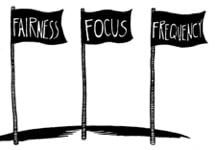It’s time we redeem feedback. Why? Because feedback has a branding problem — a negative reputation that has been built one lousy experience at a time. Not only have we gotten feedback wrong, but as humans, we’re paying a significant price for our feedback missteps and misuse.
However, when we take a step back and think about feedback’s true intent, we realize that it shouldn’t be a bad thing. If we as humans want to improve, grow, and advance, we need insights that help us do that. And when we get it right, feedback lifts us up, helps us understand our strengths, shows us pathways to achieve that next step, and sometimes even changes the course of our lives.The roots of feedback’s branding problem lie in the way we think about it and experience it. Our misconceptions, bad habits, and defense mechanisms have led us astray. To redeem feedback, we need to examine how we got here and, equipped with that understanding, make a fresh start on fixing feedback once and for all.
3 Actions to Building a Feedback Movement
Just to be clear, I’m not talking about a few tweaks and tune-ups. We can’t fix feedback by increasing the volume on poorly executed exchanges, nor will a call for more direct feedback in cultures where there is uncertainty, distrust, and outdated feedback ideas give us any relief. Our fix requires a fundamental change, a seismic philosophical shift in our thinking about feedback. To redeem feedback needs a movement! This movement starts with you and me.
To get our movement off the ground requires that we take three actions:
- Embrace a new working definition of feedback
- Anchor our methods in the bedrock ideas of trust, connection, and the three fabulous F’s of fairness, focus, and frequency
- Build an army of Seekers who are empowered to ask for insights
A New Definition of Feedback
We’re putting forward a new definition for our movement to embrace. It looks like this:

[image description: Feedback (noun): Clear and specific information that's sought or extended with the sole intention of helping individuals improve, grow, or advance.]
Each of those words has been carefully selected. Take particular notice of the concept that feedback should have “the sole intention of helping.” If feedback isn’t intended to help individuals or teams thrive and grow, they why offer it or seek it? Equally important is tuning in to what’s not in our definition: namely, that in our better feedback future, feedback is not intended for evaluation, blame, or judgment. Helpful feedback inspires us to look forward to a better version of ourselves, our organization, or our team. Raking our past over the coals and attaching an evaluative label to people has little to do with creating a better you, me, or us.
Bedrock Ideas
To develop individuals and build teams that thrive, grow, and operate at optimum levels of performance, we must start with trust. Trust is built over time through human connections that are kind and supportive and that send a strong message that we’re in this together. Trust isn’t built in a day; there is no shortcut. It’s the product of an ongoing process that is influenced by how we show up in every conversation, decision, and action. If we begin by building trusted connections with those valuable people who see us at our best (and worst) every day, we’ll have a solid foundation for our movement.
Every successful movement needs a call to action, a motto that inspires its followers and keeps them true to the mission. We’re launching our movement under the banner of Fairness, Focus, and Frequency.

And as we march forward together, we plan to fly these three F’s high and proud:
- Fairness: For feedback to work, there must be trust. If a relationship or any given exchange is tainted with a perceived lack of fairness, feedback won’t work, and trust is broken. While most of us have the best intentions to be fair, our human tendency toward bias gets in our way. To operate with fairness, we need to engage without judgment. That’s a tall ask yet it is possible if we lean on what we’ve witnessed and noticed. If we bring that noticing into an open conversation, amazing things can happen, and trust will grow.
- Focus: Focus is a big idea delivered in small bites. In our daily lives, we already have too much information to process. For feedback to help, we need to keep it focused. Focused feedback is like snacking on positivity and possibility, as opposed to gorging on performance reviews and banked-up lists of strengths and weaknesses. If you’re looking for some feedback, make it a focused ask for perspectives on just one thing. If you feel compelled to tell someone they rocked it, tell them the one thing you noticed that set the bar. If there is one thing you can do to have a far greater impact, then share what you noticed. That’s it: one thing.
- Frequency: The more often we connect, the greater the trust we build, which is why frequency is critical for strong, helpful feedback. Frequency accelerates feedback while fairness and focus fuel the engine. Frequency improves the quality of our relationships and accelerates our learning; it tells others, “I’m paying attention, and what you do is important and notable.”
When we embrace these three Fs, feedback is light and easy. Quick observations delivered frequently and without pomp and circumstance will have far more impact than infrequent, formal, and contrived conversations. When feedback is fair, focused, and frequent, trust thrives; learning happens, and everyone involved is freed to take more risks and seek greater growth.
Army of Seekers
Our movement must start with Seekers, and I’m hoping we can enlist you. Why do Seekers play the most important role in fixing feedback? The reasons are many. Here are just a few:
- Seeking is the ultimate trust generator. It demonstrates humility and that you value the input of others.
- Seeking helps us build connections with others and nurtures our trusted relationships.
- When you seek feedback, you’re more likely to act on it.
- When you’re seeking, you’re in control. You can request the insights you need to grow and advance according to your plan, not someone else’s.
Are you ready to join the movement? Imagine what we can do together. Imagine creating cultures in which feedback flourishes. Imagine a world where we feel safe being authentic and transparent about who we are, and just as open about the work we still need to do to be who we want to be. A world where we let go of fear and embrace the help others offer us. Imagine.
M. Tamra Chandler is the CEO and cofounder of PeopleFirm, a talent management and organizational performance consultancy that has earned consistent recognition as a top place to work. She has been named twice as one of the top twenty-five consultants in the United States by Consulting magazine. She holds an MBA from the University of Washington. She is the author of How Performance Management Is Killing Performance - and What to Do about It and the co-author of Feedback (and Other Dirty Words).



